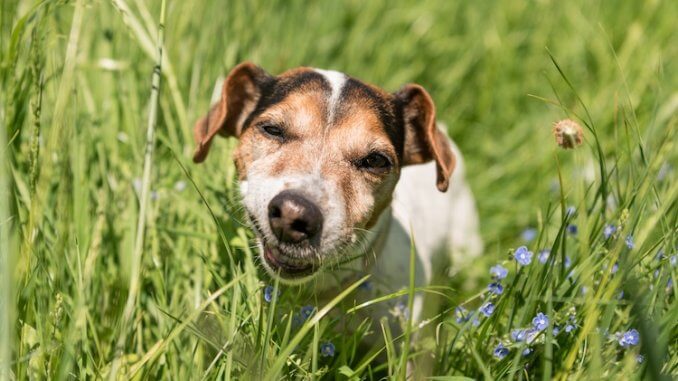
If you look at any peer-reviewed article around grass-eating in dogs, most of them state very early-on that, apart from dogs spending 3 to 4 minutes each day eating grass, very little is known about it.
Most dog owners have seen their dog eat grass, but falling short of a conversation with our pet, we can’t ever be clear why.
Dogs will eat grass. Sometimes they will vomit afterwards, and sometimes they won’t. This is where many have suggested that grass-eating is a way to ease digestive discomfort.
Some argue that grass is seen as a food source for dogs. But, this is largely due to the common misconceptions that dogs who eat grass are nutritionally deficient.
In this article, we debunk some myths on why dogs eat grass, share some reasons for what could cause this behavior, and give some tips on what you should do about it.
TABLE OF CONTENTS
Why Do Dogs Eat Grass?
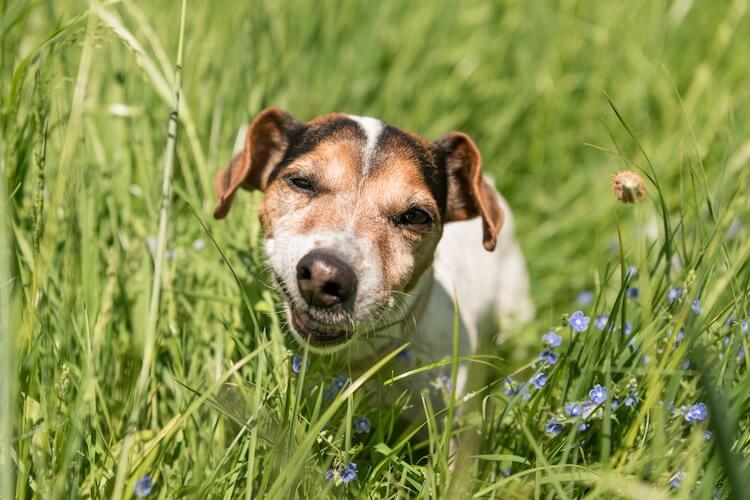
1. Digestive Discomfort or Illness
One particular study explored dogs eating grass. All of the dogs participating in the study had a full health check carried out by a veterinarian. They were all deemed in good health (fully de-wormed and free of any diagnosed digestive issues).
In 12 dogs of undertaking the study, 709 grass-eating events occurred and only five vomiting events followed.
With no diagnosed health issues in the dogs, and very few vomiting incidences, the study found no evidence to link the number of grass eating events to illness or digestive discomfort.
The myth of digestive discomfort or illness causing dogs to eat grass has stayed relevant, as humans tend to only remember the vomiting occurrences as opposed to the total number of grass-eating incidences.
2. They Are Lacking Nutrients
Another common reason given for why dogs eat grass is from a lack of a specific nutrient (i.e., mineral or vitamin).
However, there is little evidence to support the idea that dogs eat grass to gain vital nutrients they aren’t receiving from their typical diet.
When studied, there was no indication that dogs fed a table scrap, commercial or raw food diet were more or less likely to eat grass.
However, all those diets still observed grass eating dogs!
3. Your Dog Is Hungry
Is grass just a food source for dogs?
If it is considered a food source, then like any scavenged or street-food, can it sometimes result in sickness?
When considering how much grass dogs eat and when, it is clear that dogs eat more grass before their usual mealtime.
They tend to eat more grass in the morning (most events noted in studies were in the morning). As the day continues the probability of this behavior starting reduces (i.e. they are more likely to spend less time eating grass as the day continues).
Data could suggests that grass-eating is simply a hunger response. As grass is often widely accessed, it is an easily-accesible food source.
This theory is also supposed when you consider the science behind bilious vomiting syndrome. Bile vomiting occurs on an empty stomach. The dog eats grass because he is hungry and because there’s not much sustenance, the bilious vomit occurs anyway.
Sugar content in grass increases throughout the day as photosynthesis occurs, then if low temperatures are experienced overnight, the stored sugars aren’t accessed for growth and so remain high. The sugar content of the grass may impact sickness events in dogs.
4. Their Ancestors Are Grass-Eaters
Grass-eating behavior is an innate predisposition inherited from wild canid ancestors.
It is believed that purging on plants was an effective way to control intestinal parasites.
Plant-material passes through the intestines, wrapping around worms. As it passes through the tract, it takes the worms with it.
Studies have shown that dogs don’t eat grass because they have worms. However, our dogs are simply demonstrating a behavior that is innate to them from their ancestors.
No evidence to date suggests any nutritional or illness-related reason for grass eating in dogs.
The most likely explanation is that it’s an inherited behavior. The second explanation is that it potentially serves as an easy source of food for those greedy eaters.
Is Eating Grass Bad For Dogs?
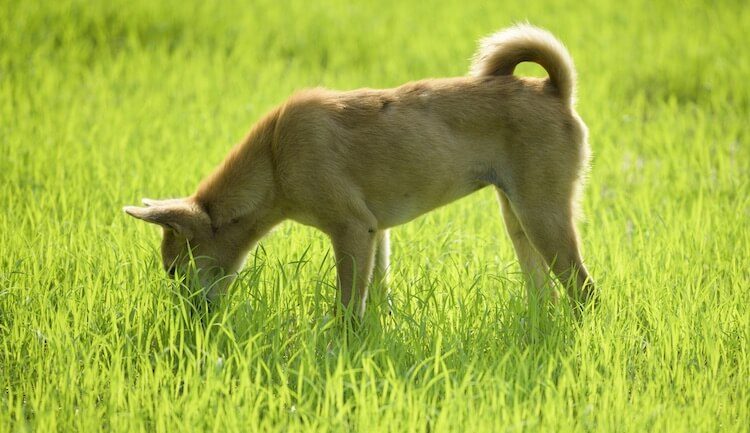
If your dog is in general good health, then his grass eating is likely nothing to worry about. It is unlikely that any underlying reasons are triggering this behavior. However, if sickness bouts become regular, then it is worth visiting your veterinarian to rule out any specific health issues.
Eating grass isn’t bad for dogs.
While some dogs vomit after they eat grass, it isn’t likely to have any detrimental long-term impact on their health.
The issue arises when dogs eat grass that have been chemically treated, or they eat some toxic plants. Many herbicides pose little risk to pets, except for glyphosate (a common product used to control weeds).
Exposure to glyphosate toxicity can result in vomiting, diarrhea and lethargy.
You also have the risk of toxic plants which are not limited to, but include:
| Sago Palm | Tomato Plant | Aloe Vera | Ivy |
| Amaryllis | Gladiola | American Holly | Daffodil |
| Baby’s Breath | Milkweed | Castor Bean | Azalea/Rhododendron |
| Tulip | Chrysanthemum | Begonia | Oleander |
If you are concerned that your dog has ingested a toxic plant, seek immediate veterinarian advice.
Training A Dog To Stop Eating Grass?

There is an argument that a dog eats grass because they are hungry, so you could start by changing your dog’s mealtimes. See if they reduce this behavior when you feed them early morning. Would your dog benefit from having more, smaller meals throughout the day?
If you are concerned that your dog may eat chemically treated grass or get into toxic plants, the best way to stop him is to supervise whenever he is outside. If he attempts to eat the grass, distract and then reward him.
Separate to this you could teach him the leave command. Then, when he heads for grass or plants, you can tell him to leave it.
Teaching the Leave command
- Start with a treat in a closed hand
- Your dog will likely sniff at it
- Wait for him to ignore the treat or turn his head away
- As soon as he does, give him the treat
- Repeat
- As he ignores it, label the behavior, leave!
- Repeat many times in different environments
You can then progress to:
- Having a treat in an open hand and telling your dog to leave
- You can offer a treat on the floor, or at one side of the room to build on the command too
Remember to give him the treat as soon as he ignores it and then slowly increase the time between you asking him to leave.
Should You Visit A Vet After Your Dog Eats Grass?

If your dog is regularly sick after eating grass, and they are bringing up more than grass, then it could be worth a visit to see your Veterinarian.
Your Veterinarian can carry out a full health check and once you know he is in good health, you may feel a little less worried about his grass eating.
If your dog is showing other symptoms like diarrhea, lethargy, or respiratory distress after they eat grass, there is a possibility he has ingested toxic chemicals or a toxic plant. You should seek veterinary attention immediately.
Summary
There is little scientific evidence to suggest any nutritional or illness-related reasons for why dogs eat grass; the most likely reason is that it merely serves as a food source for greedy eaters.
Why a dog vomits after eating grass could be explained by the time of day they eat grass. The other potential explanation is that it is simply an inherited behavior for parasite control.
The concern is when a dog ingests chemically laden grass or toxic plants.
If you are concerned that your dog has been poisoned by eating grass, then seek veterinarian attention immediately.

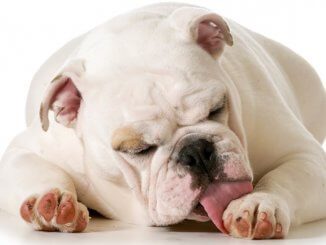

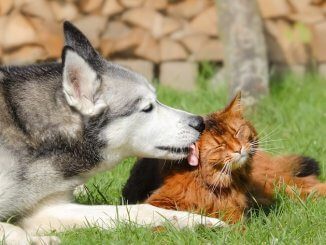
I adopted a Puggle 2 years ago. He is coming up for 11 years old. He doesn’t eat grass in our yard but there is a certain grass he just loves to eat on our walks and has done this since I got him. I don’t know what it is about this particular grass but if he is off lead he will stay in that one spot for ages eating it!